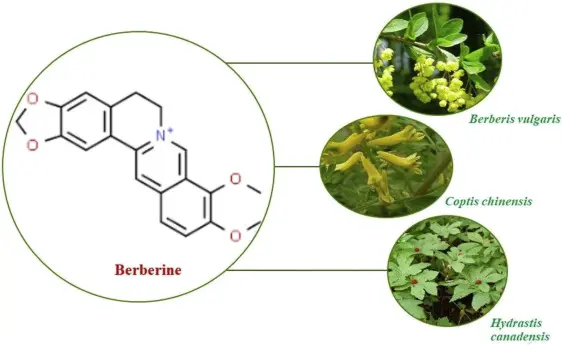Berberine: Beyond Digestive Health
Berberine, known for its bitter taste and long history in traditional Chinese medicine, is widely recognized as a remedy for diarrhea. Extracted from the herb Coptis chinensis, berberine (berberine hydrochloride) is a quaternary ammonium alkaloid and the primary antibacterial component of Coptis. While its use in treating bacterial infections like dysentery and E. coli-induced diarrhea is well-established, recent studies reveal that berberine's potential extends far beyond digestive health.


1. Regulating Blood Sugar Levels
Recent clinical studies demonstrate berberine’s ability to regulate blood sugar levels effectively. Berberine stimulates insulin secretion, improves insulin sensitivity, and combats hyperglycemic hormones. These properties make it a valuable tool for managing type 2 diabetes.
A paper titled Advances in the Mechanism of Berberine’s Effects on Glucose and Lipid Metabolism highlights its ability to lower blood glucose levels, as confirmed through extensive animal experiments. These findings position berberine as a promising natural alternative for diabetes management
2. Improving Lipid Profiles
Berberine's role in lowering blood lipids has been validated in clinical settings. Experts at Nanjing First Hospital uncovered its ability to accelerate cholesterol breakdown in the liver and soften blood vessels, thus mitigating hyperlipidemia.
Although large-scale Phase II and III clinical trials are pending, early results published in renowned journals like Nature suggest berberine's potential to lower blood lipid levels and improve cardiovascular health.
3. Preventing Cancer Recurrence
A groundbreaking study published in The Lancet Gastroenterology & Hepatology revealed that berberine could help prevent the recurrence of colorectal adenomas following endoscopic removal.
This multi-center clinical trial, led by Shanghai Renji Hospital and supported by seven other prominent medical institutions, underscores berberine's potential in cancer prevention. Although this application has yet to be officially included in product guidelines, the findings highlight berberine's emerging role in oncology.
Conclusion

Traditionally known as a treatment for diarrhea, berberine has proven to be much more versatile. Its applications in blood sugar and lipid regulation, along with its potential in cancer prevention, are being gradually uncovered through modern research. As studies progress, berberine is emerging as a powerful natural compound with far-reaching health benefits, reinforcing its importance in both traditional and modern medicine.










